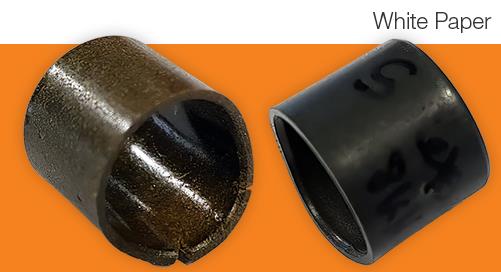How to Select Plain Bearings for Sheet Metal
 Normally, plain bearings are intended to be installed in relatively thick-walled structures. The bearing is pressed into an appropriately tolerated hole and remains there. With thin-walled components, this can be difficult with the press fit. But there are also stumbling blocks beyond fixing, which we want to take a closer look at here. Read on for some tips on how to correctly select plain bearings for sheet metal.
Normally, plain bearings are intended to be installed in relatively thick-walled structures. The bearing is pressed into an appropriately tolerated hole and remains there. With thin-walled components, this can be difficult with the press fit. But there are also stumbling blocks beyond fixing, which we want to take a closer look at here. Read on for some tips on how to correctly select plain bearings for sheet metal.
Beware of Holes with Sharp Edges
Before you even consider the shape of the plain bearing, you should look at the bore first. Thin-walled sheets are often machined cost-effectively. For the plain bearing solution, this means one thing above all: bad fixing holes. As a rule, these holes are punched or lasered without additional post-processing. This primarily results in sharp-edged contours and, in the case of punches, in rather coarse tolerances. Particularly for plastic plain bearings, sharp-edged holes are not ideal. It is best to chamfer these edges lightly or at least deburr them. If this is not possible, free the bores from burrs and other protruding material. The tolerances can hardly be changed without re-drilling. A process that is simply too expensive for many sheet metal constructions. Since the manufacturing tolerances are primarily responsible for the press fit of the plain bearing, this fact can be avoided with a clever design.
Securely Fasten the Slide Bearing
If we don't get an H7 fit in our sheet, it gets shaky. If the overlap of the bore and bearing fits is not sufficient, the bearing does not stop in the bore. The bearing “moves” out of the hole without additional positive locking. The danger: The shaft runs directly into the hole, without a protective bearing. This positive fit is achieved through undercuts. You can screw plain bearings directly to the surrounding construction with flanges. However, screw connections cost additional assembly time and the common flange bushings only secure in one direction before falling out. Better: two "frets". But then how do you fix the bearing into the hole? There are slotted versions with several undercuts. These can be pressed together during assembly.
Consider Environmental Factors
Slide bearings for sheet metal often have to meet other requirements, such as food exposure or high temperatures. This is no longer about the shape of the component, but about choosing the right material. Plastic plain bearings can offer a good alternative to metal bearings as they are corrosion-resistant and do not require any external lubrication. There are even various possibilities of processing plastics into versatile or highly specialized compounds, or mixtures that resist such special requirements.
Off-the-Shelf Plastic Bearing Solutions
 iglide® M250 clip bearings (pictured left) can easily be clipped into metal sheets. Squeeze, push through, and you’re done. The shape and flexibility of these plain bearings make them ideal for sheet metal. They consist of the inexpensive iglde® M250 material, are injection molded and thus offer a cost-effective alternative to metal plain bearings.
iglide® M250 clip bearings (pictured left) can easily be clipped into metal sheets. Squeeze, push through, and you’re done. The shape and flexibility of these plain bearings make them ideal for sheet metal. They consist of the inexpensive iglde® M250 material, are injection molded and thus offer a cost-effective alternative to metal plain bearings.
 Clip bearings made of iglide® A230 (pictured right), on the other hand, are particularly suitable for applications in the food sector. The material is FDA and EU10/2011 compliant and can therefore be used in contact with food. In addition, this material is flexible, yet dimensionally stable.
Clip bearings made of iglide® A230 (pictured right), on the other hand, are particularly suitable for applications in the food sector. The material is FDA and EU10/2011 compliant and can therefore be used in contact with food. In addition, this material is flexible, yet dimensionally stable.
The temperature and chemical-resistant material iglide® K250 is particularly suitable for automotive and furniture applications as well as other consumer goods that need to be painted.
Interested in learning more about iglide® plastic plain bearings? Visit our iglide® webpage or contact us to speak with an igus® expert.



